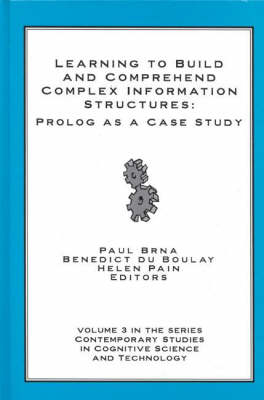
Learning to Build and Comprehend Complex Information Structures
Praeger Publishers Inc (Verlag)
978-1-56750-434-7 (ISBN)
PAUL BRNA is Reader in Interactive Learning Systems in the Computer Based Learning Unit at the University of Leeds./e Paul works on the applications of Artificial Intelligence to Education, including research into the interpretation and use of external representations and narrative in collaborative program construction and debugging. BENEDICT DU BOULAY is Professor of Artificial Intelligence Subject Group within the School of Cognitive and Computer Sciences. He is a member of the Human Centred Technology Research Group working in the areas of Artificial Intelligence in Education and the Psychology of Programming, University of Sussex. HELEN PAIN is Senior Lecturer at the Division of Informatics, University of Edinburgh.
Acknowledgments
Part I: Introduction, Paul Brna, Benedict du Boulay, and Helen Pain
Building and Manipulating Complex Information Structures: Issues in Prolog Programming, Thomas Green
Detecting Design Decisions About Data Structures in Prolog Programs, Diana Bental
Analyzing Novices Analyzing Prolog: What stories do novices tell themselves about Prolog? Josie Taylor
Towards a Taxonomy of Novices' Misconceptions of the Prolog Interpreter, Pat Fung, Mike Brayshaw, Benedict du Boulay, and Mark Elsom-Cook
The Use of Examples in Expository Texts: Outline of an Interpretation Theory for Text Analysis, Ian Robertson.
Part II: Intermediate Representations: Effective Support for Novice Programmers? Paul Brna
Programming Techniques for Prolog, Paul Brna, Alan Bundy, Tony Dodd, Marc Eisenstadt, Chee-Kit Looi, Helen Pain, Dave Robertson, Barbara Smith, and Maarten van Somerson
Introductory Prolog: A Suitable Selection of Programming Techniques, Andy Bowles and Paul Brna
An Empirical Evaluation of Ted, A Techniques Editor for Prolog Programming, Thomas C. Ormerod and Linden J. Ball
A Case-Based Reasoning Approach to Supporting Novice Programmers, Andy Bowles, Dave Robertston, and Paul Brna
Part III: Support for Program Analysis, Benedict du Boulay
Abstract Views of Prolog Executions in Opium, Mireille Ducassé
Tracing and Debugging Prolog and PARLOG: an information management approach
A Revised Textual Tree Trace Notation For Prolog, Chris Taylor, Benedict du Boulay, and Mukesh Patel
The ISM Framework: Understanding and Evaluating Software Visualization Tools, Paul Mulholland
Software Visualization as a Pedagogical Tool: Redressing Some ITS Fallacies, Marc Eisenstadt, Blaine A. Price, and John Domingue
Part IV: Teaching and Learning Environments for Novice Programmers, Paul Brna
Exploiting Program Schemata to Teach Recursive Programming, Timothy S. Gegg-Harrison
Learning Prolog Debugging Skills, Paul Brna, Edmundo Robert Hernanzes, and Helen Pain
Teaching Prolog Debugging in a Motivation Manner, Teresa del Soldato and Benedict du Boulay
Author Index
Subject Index
| Erscheint lt. Verlag | 13.8.1999 |
|---|---|
| Reihe/Serie | Contemporary Studies in Cognitive Science and Technology |
| Sprache | englisch |
| Maße | 156 x 235 mm |
| Themenwelt | Geisteswissenschaften ► Psychologie ► Pädagogische Psychologie |
| Mathematik / Informatik ► Informatik ► Programmiersprachen / -werkzeuge | |
| Informatik ► Theorie / Studium ► Algorithmen | |
| ISBN-10 | 1-56750-434-5 / 1567504345 |
| ISBN-13 | 978-1-56750-434-7 / 9781567504347 |
| Zustand | Neuware |
| Haben Sie eine Frage zum Produkt? |
aus dem Bereich


